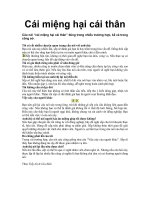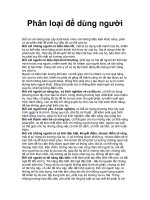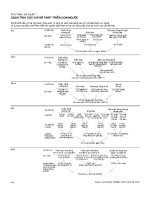Tài liệu Dangerous Google - Searching for Secrets pptx
Bạn đang xem bản rút gọn của tài liệu. Xem và tải ngay bản đầy đủ của tài liệu tại đây (2.11 MB, 12 trang )
Dangerous Google
– Searching for Secrets
Michał Piotrowski
This article has been published in issue 4/2005 of the hakin9 magazine.
All rights reserved. This file may be distributed for free pending no changes are made to its contents or form.
hakin9 magazine, Wydawnictwo Software, ul. Lewartowskiego 6, 00-190 Warszawa,
www.hakin9.org
2
hakin9 4/2005
Basics
G
oogle serves some 80 percent of all
search queries on the Internet, mak-
ing it by far the most popular search
engine. Its popularity is due not only to excel-
lent search effectiveness, but also extensive
querying capabilities. However, we should
also remember that the Internet is a highly
dynamic medium, so the results presented
by Google are not always up-to-date – some
search results might be stale, while other
relevant resources might not yet have been
visited by Googlebot (the automatic script
that browses and indexes Web resources for
Google).
Table 1 presents a summary of the most
important and most useful query operators
along with their descriptions, while Figure 1
shows document locations referred to by the
operators when applied to Web searches. Of
course, this is just a handful of examples – skil-
ful Google querying can lead to much more
interesting results.
Hunting for Prey
Google makes it possible to reach not just
publicly available Internet resources, but also
some that should never have been revealed.
Dangerous Google
– Searching for Secrets
Michał Piotrowski
Information which should be
protected is very often publicly
available, revealed by careless
or ignorant users. The result is
that lots of condential data is
freely available on the Internet
– just Google for it.
About the Author
Michał Piotrowski holds an MA in IT and has
many years' experience in net work and system
administration. For over three years he has
been a security inspector and is currently work-
ing as computer network security expert at one
of the largest Polish financial institutions. His
free time is occupied by programming, cryp-
tography and contributing to the open source
community.
What You Will Learn...
• how to use Google to nd sources of personal
information and other condential data,
• how to nd information about vulnerable sys-
tems and Web services,
• how to locate publicly available network de-
vices using Google.
What You Should Know...
• how to use a Web browser,
• basic rules of operation of the HTTP protocol.
www.hakin9.org
3
hakin9 4/2005
Google hacking
Table 1. Google query operators
Operator Description Sample query
site
restricts results to sites within the
specied domain
site:google.com fox
will nd all sites containing the
word fox, located within the *.google.com domain
intitle
restricts results to documents whose
title contains the specied phrase
intitle:fox re
will nd all sites with the word fox in the
title and re in the text
allintitle
restricts results to documents
whose title contains all the specied
phrases
allintitle:fox re
will nd all sites with the words fox
and re in the title, so it's equivalent to
intitle:fox
intitle:re
inurl
restricts results to sites whose URL
contains the specied phrase
inurl:fox re
will nd all sites containing the word re
in the text and fox in the URL
allinurl
restricts results to sites whose URL
contains all the specied phrases
allinurl:fox re
will nd all sites with the words fox
and re in the URL, so it's equivalent to
inurl:fox
inurl:re
letype, ext
restricts results to documents of the
specied type
letype:pdf re
will return PDFs containing the word
re, while letype:xls fox will return Excel spreadsheets
with the word fox
numrange
restricts results to documents con-
taining a number from the specied
range
numrange:1-100 re
will return sites containing a number
from 1 to 100 and the word re. The same result can be
achieved with
1..100 re
link
restricts results to sites containing
links to the specied location
link:www.google.com
will return documents containing
one or more links to www.google.com
inanchor
restricts results to sites containing
links with the specied phrase in
their descriptions
inanchor:re
will return documents with links whose
description contains the word re (that's the actual link
text, not the URL indicated by the link)
allintext
restricts results to documents con-
taining the specied phrase in the
text, but not in the title, link descrip-
tions or URLs
allintext:"re fox"
will return documents which con-
tain the phrase re fox in their text only
+
species that a phrase should occur
frequently in results
+re
will order results by the number of occurrences of
the word re
-
species that a phrase must not oc-
cur in results
-re
will return documents that don't contain the word
re
""
delimiters for entire search phrases
(not single words)
"re fox"
will return documents containing the phrase
re fox
.
wildcard for a single character
re.fox
will return documents containing the phrases
re fox, reAfox, re1fox, re-fox etc.
*
wildcard for a single word
re * fox
will return documents containing the phrases
re the fox, re in fox, re or fox etc.
|
logical OR
"re fox" | refox
will return documents containing the
phrase re fox or the word refox
www.hakin9.org
4
hakin9 4/2005
Basics
The right query can yield some quite
remarkable results. Let's start with
something simple.
Suppose that a vulnerability is
discovered in a popular application
– let's say it's the Microsoft IIS server
version 5.0 – and a hypothetical at-
tacker decides to nd a few comput-
ers running this software in order to
attack them. He could of course use
a scanner of some description, but
he prefers Google, so he just enters
the query
"Microsoft-IIS/5.0 Server
at" intitle:index.of
and obtains
links to the servers he needs (or,
more specically, links to autogen-
erated directory listings for those
servers). This works because in its
standard conguration, IIS (just like
many other server applications) adds
banners containing its name and ver-
sion to some dynamically generated
pages (Figure 2 shows this query in
action).
It's a typical example of infor-
mation which seems quite harm-
less, so is frequently ignored
and remains in the standard con-
guration. Unfortunately, it is also
information which in certain circum-
stances can be most valuable to
a potential attacker. Table 2 shows
more sample Google queries for
typical Web servers.
Another way of locating specic
versions of Web servers is to search
for the standard pages displayed
after successful server installation.
Strange though it may seem, there
are plenty of Web servers out there,
the default conguration of which
hasn't been touched since installa-
tion. They are frequently forgotten,
ill-secured machines which are
easy prey for attackers. They can
be located using the queries shown
in Table 3.
This method is both very simple
and extremely useful, as it provides
access to a huge number of various
websites and operating systems
which run applications with known
vulnerabilities that lazy or ignorant
administrators have not patched. We
will see how this works for two fairly
popular programs: WebJeff Fileman-
ager and Advanced Guestbook.
The rst is a web-based le
manager for uploading, browsing,
managing and modifying les on
a server. Unfortunately, WebJeff
Filemanager version 1.6 contains
a bug which makes it possible
to download any le on the server,
as long as it's accessible to the user
running the HTTP daemon. In other
words, specifying a page such as
/index.php3?action=telecharger&f
ichier=/etc/passwd in a vulnerable
system will let any intruder download
the /etc/passwd le (see Figure 3).
The aggressor will of course locate
vulnerable installations by querying
Google for
"WebJeff-Filemanager
1.6" Login
.
Our other target – Advanced
Guestbook – is a PHP application
Figure 1. The use of search query operators illustrated using the hakin9
website
Figure 2. Locating IIS 5.0 servers using the intitle operator
www.hakin9.org
5
hakin9 4/2005
Google hacking
with SQL database support, used
for adding guestbooks to web-
sites. In April 2004, information
was published about a vulnerabil-
ity in the application's 2.2 version,
making it possible to access the
administration panel using an SQL
injection attack (see SQL Injection
Attacks with PHP/MySQL in hakin9
3/2005). It's enough to navigate
to the panel login screen (see
Figure 4) and log in leaving the
username blank and entering
') OR
('a' = 'a
as password or the other
way around – leaving password
blank and entering
? or 1=1 --
for
username. The potential aggres-
sor can locate vulnerable websites
by querying Google for
intitle:
Guestbook "Advanced Guestbook 2.2
Powered"
or
"Advanced Guestbook
2.2" Username inurl:admin
.
To prevent such security leaks,
administrators should track current
information on all the applications
used by their systems and imme-
diately patch any vulnerabilities.
Another thing to bear in mind is that
it's well worth removing application
banners, names and versions from
any pages or les that might contain
them.
Information about
Networks and Systems
Practically all attacks on IT sys-
tems require preparatory target
reconnaissance, usually involving
scanning computers in an attempt
Table 2. Google queries for locating various Web servers
Query Server
"Apache/1.3.28 Server at" intitle:index.of
Apache 1.3.28
"Apache/2.0 Server at" intitle:index.of
Apache 2.0
"Apache/* Server at" intitle:index.of
any version of Apache
"Microsoft-IIS/4.0 Server at" intitle:index.of
Microsoft Internet Information Services 4.0
"Microsoft-IIS/5.0 Server at" intitle:index.of
Microsoft Internet Information Services 5.0
"Microsoft-IIS/6.0 Server at" intitle:index.of
Microsoft Internet Information Services 6.0
"Microsoft-IIS/* Server at" intitle:index.of
any version of Microsoft Internet Information Services
"Oracle HTTP Server/* Server at" intitle:index.of
any version of Oracle HTTP Server
"IBM _ HTTP _ Server/* * Server at" intitle:index.of
any version of IBM HTTP Server
"Netscape/* Server at" intitle:index.of
any version of Netscape Server
"Red Hat Secure/*" intitle:index.of
any version of the Red Hat Secure server
"HP Apache-based Web Server/*" intitle:index.of
any version of the HP server
Table 3. Queries for discovering standard post-installation Web server pages
Query Server
intitle:"Test Page for Apache Installation" "You are free"
Apache 1.2.6
intitle:"Test Page for Apache Installation" "It worked!"
"this Web site!"
Apache 1.3.0 – 1.3.9
intitle:"Test Page for Apache Installation" "Seeing this
instead"
Apache 1.3.11 – 1.3.33, 2.0
intitle:"Test Page for the SSL/TLS-aware Apache
Installation" "Hey, it worked!"
Apache SSL/TLS
intitle:"Test Page for the Apache Web Server on Red Hat
Linux"
Apache on Red Hat
intitle:"Test Page for the Apache Http Server on Fedora
Core"
Apache on Fedora
intitle:"Welcome to Your New Home Page!" Debian
Apache on Debian
intitle:"Welcome to IIS 4.0!"
IIS 4.0
intitle:"Welcome to Windows 2000 Internet Services"
IIS 5.0
intitle:"Welcome to Windows XP Server Internet Services"
IIS 6.0









